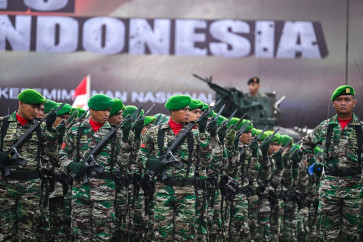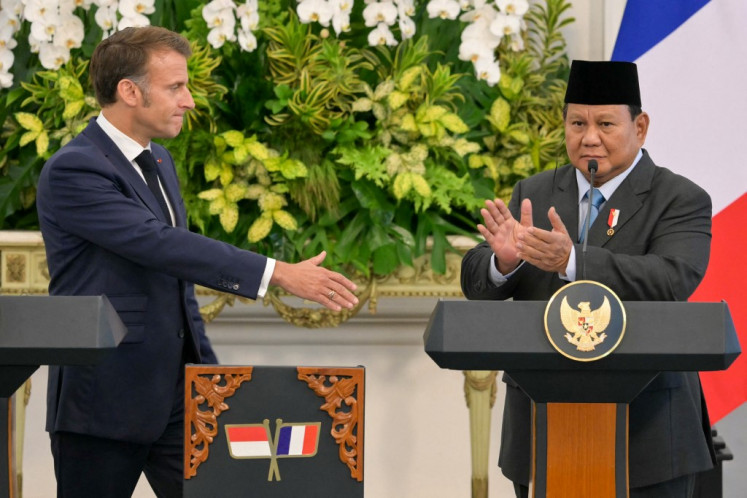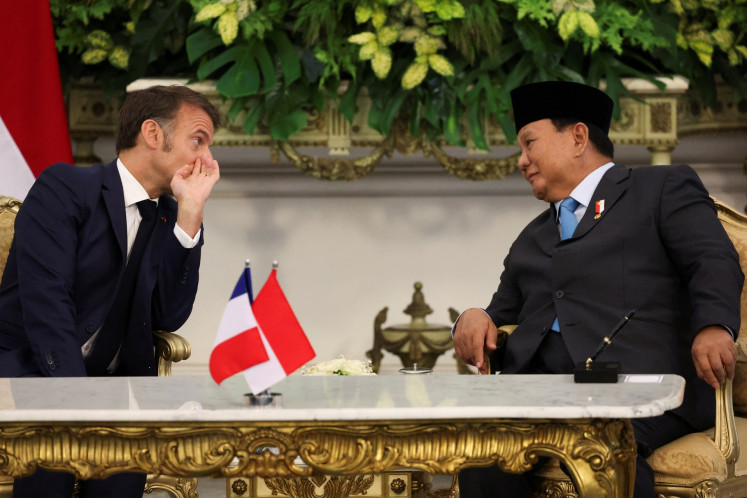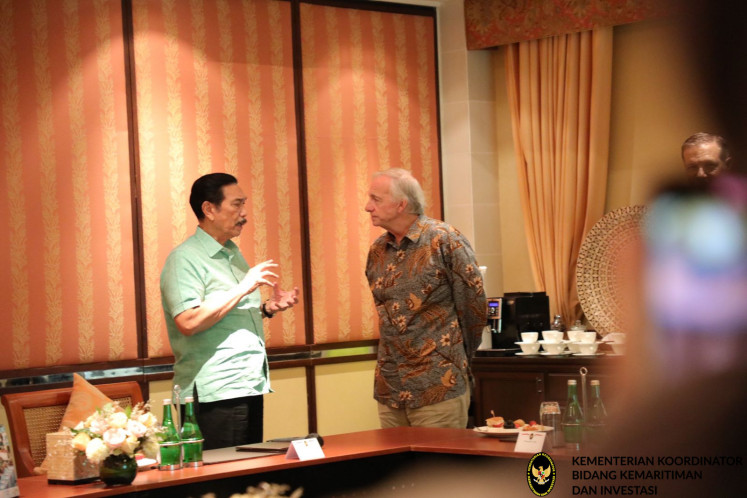INSIGHT: China: A hegemon or strategic partner?
Change text size
Gift Premium Articles
to Anyone
 Indonesian president Joko Widodo, left, inspects a model of the high-speed train which will connect the capital city of Jakarta to the country's fourth largest city, Bandung, with President of China Railway Corp. Sheng Guangzu, right, Chinese State Councillor Wang Yong, second right, and Chinese Ambassador to Indonesia Xie Feng, third right, during the groundbreaking ceremony for the construction of its railway in Cikalong Wetan, West Java, Indonesia, Thursday, Jan. 21, 2016. (AP Photo/Dita Alangkara)
Indonesian president Joko Widodo, left, inspects a model of the high-speed train which will connect the capital city of Jakarta to the country's fourth largest city, Bandung, with President of China Railway Corp. Sheng Guangzu, right, Chinese State Councillor Wang Yong, second right, and Chinese Ambassador to Indonesia Xie Feng, third right, during the groundbreaking ceremony for the construction of its railway in Cikalong Wetan, West Java, Indonesia, Thursday, Jan. 21, 2016. (AP Photo/Dita Alangkara)
A
n opinion article entitled “How do we engage a hegemonic China?” by CSIS researcher Evan Laksmana in The Jakarta Post on Oct. 12, has prompted me to offer a different perspective that may help readers look at Indonesia-China relations in a more balanced and less tendentious way.
First, the notion of China as a hegemon is incorrect if we wish to initiate or deepen engagement between the two countries. The use of the word “hegemon” demonstrates Laksamana’s lack of knowledge on China and Chinese political culture. In English “hegemon” is a relatively neutral word. The phrase “benevolent hegemon” in English literature is widely accepted and is not seen as an oxymoron.
However, “hegemon” in Chinese is ba quan, which has a very pejorative meaning. In the Chinese mindset, a ba quan (hegemon) is somewhat of a bully or oppressor. This is a matter of political attitude instead of merely an issue of semantics or political correctness.
China itself has distanced itself from the word “hegemon”. We have frequently heard Chinese official statements that say, “China will never follow in the footsteps of other big powers that sought hegemony once they grew strong.” Regardless of how neighboring states feel about China, it is trying to polish its image as a peaceful rising power that does not aspire to become a hegemon.
The question is, if we want to engage China, what kind of message are we conveying by calling it a hegemon? Does the assumption of China as a hegemon serve our national interest? Should we adopt sensitivity and a balanced attitude to address our strategic partner?
Second, putting the South China Sea or other security issues on the frontline of our engagement with China is not a visionary strategy. China is our comprehensive strategic partner, meaning our engagement with China covers a wide range of issues. Since we are neither allies nor enemies, security issues should not dominate our relations.
According to Indonesia’s Investment Coordinating Board (BKPM), China has just broken into the top 10 list of Indonesia’s investors in 2015. Keep in mind that both countries have been strategic partners since 2005. Given the Indonesian government’s objective to expedite infrastructure projects, it is a great loss for Indonesia not to engage with China more deeply like other Southeast Asian nations.
Take the Philippines as a lesson. This does not mean condoning Duterte’s move in bashing the US and leaning toward China. This also does not mean to undermine the UNCLOS Tribunal ruling in July. Indonesia as a natural leader of ASEAN should promote the enforcement of international law, including the UNCLOS as the rules of the game in the region.
However, Manila has abandoned antagonising China — an approach adopted by the previous Aquino government. One of these attitudes was likening China with the Nazis, which reflected a similar mindset to calling it a hegemon. The Philippines — which is facing a more serious dispute with China — is now adopting a moderate approach. Given this, why on earth should Indonesia be preoccupied with the South China Sea issue and see China more as a threat than a partner?
Third, and this is probably the author’s biggest disagreement with Laksamana. As he has described elsewhere, Laksmana perceives Indonesia’s non-claimant position cynically. I have argued in a Post article entitled “Indonesia ‘speaks Chinese’ in South China Sea” on 18 July, that our non-claimant position, in fact, sends a stronger signal of disapproval of China’s violation of Indonesia’s sovereign rights.
Indonesia’s non-claimant position is also the best policy to uphold the UNCLOS in governing maritime issues in the region. Can abandoning our non-claimant stance in the South China Sea — as Laksmana suggested — serve these purposes?
The non-stance position enables Indonesia to play a stronger role in the region as a mediator. If Indonesia does not show its leadership and take on a positive role in the South China Sea issue, it might be because we do not have an interest in playing that role or maybe we are underperforming diplomatically, but it is certainly not because of our non-claimant stance.
Indonesia needs China as much as China needs Indonesia; both countries have worked very hard to get rid of the hurdles in the bilateral relationship. Why do we need to erect another hurdle by facing off with China as a claimant in the South China Sea?
Regardless of all the disagreements mentioned above, Laksmana is correct by saying that our policy toward China should be more coordinated and progressive. Our relations with China are indeed too vital to be handled solely by the Foreign Ministry. The government should involve more stakeholders like think tanks, academics and business actors in dealing with China.
The comprehensive strategic partnership means working out the whole range of issues in the bilateral relations for our national interest, especially urgent ones such as infrastructure. Moreover, it all begins with our balanced perception of China.
_________________________
The writer is the PhD candidate at Department of Government and International Relations, University of Sydney.









